July 7, 2025

The article emphasizes essential strategies for preparing for the BCBA exam, highlighting the significance of:
It details methods such as:
These strategies collectively enhance candidates' comprehension and confidence, thereby improving their chances of success on the certification test.
The increasing demand for Board Certified Behavior Analysts (BCBAs) underscores the critical need for effective exam preparation strategies. Aspiring candidates encounter a rigorous assessment that not only evaluates their knowledge but also their capacity to apply complex behavior analysis principles in real-world contexts. With a pass rate lingering around 65%, how can candidates distinguish themselves and thrive in this competitive arena? This article explores nine essential BCBA exam questions and strategies aimed at enhancing preparation and boosting confidence, paving the way for a successful certification journey.
The demand for Board Certified Behavior Analysts (BCBAs) is on the rise, reflecting the increasing need for expertise in behavior analysis. The BCBA assessment evaluates candidates through , consisting of 160 multiple-choice items, including 10 experimental questions that do not influence the final score. Candidates are allotted four hours to finalize the assessment, which evaluates their , including ethics, assessment, and intervention strategies. A passing score is established at 400, employing a scaled scoring system to consider variations in test difficulty.
To succeed in this challenging test, individuals must adopt for the BCBA exam questions. Have you considered how participating in study groups, utilizing detailed study guides, and taking practice tests can significantly enhance your comprehension and retention of intricate concepts? Historical data indicates that first-time candidates from accredited programs had a in 2020, while the overall pass rate for first-time candidates across all program types was 59%. This underscores the importance of thorough preparation. Individuals with , especially those who complete additional supervision hours, frequently perceive the assessment as less intimidating, as they can connect theoretical knowledge to practical situations.
Understanding the is essential for efficient study time distribution and . By familiarizing themselves with the assessment structure, candidates can control test anxiety through relaxation methods and positive self-affirmation. This strategic approach enhances their likelihood of success in tackling the certification test. Are you ready to elevate your preparation and secure your future in the field of behavior analysis?
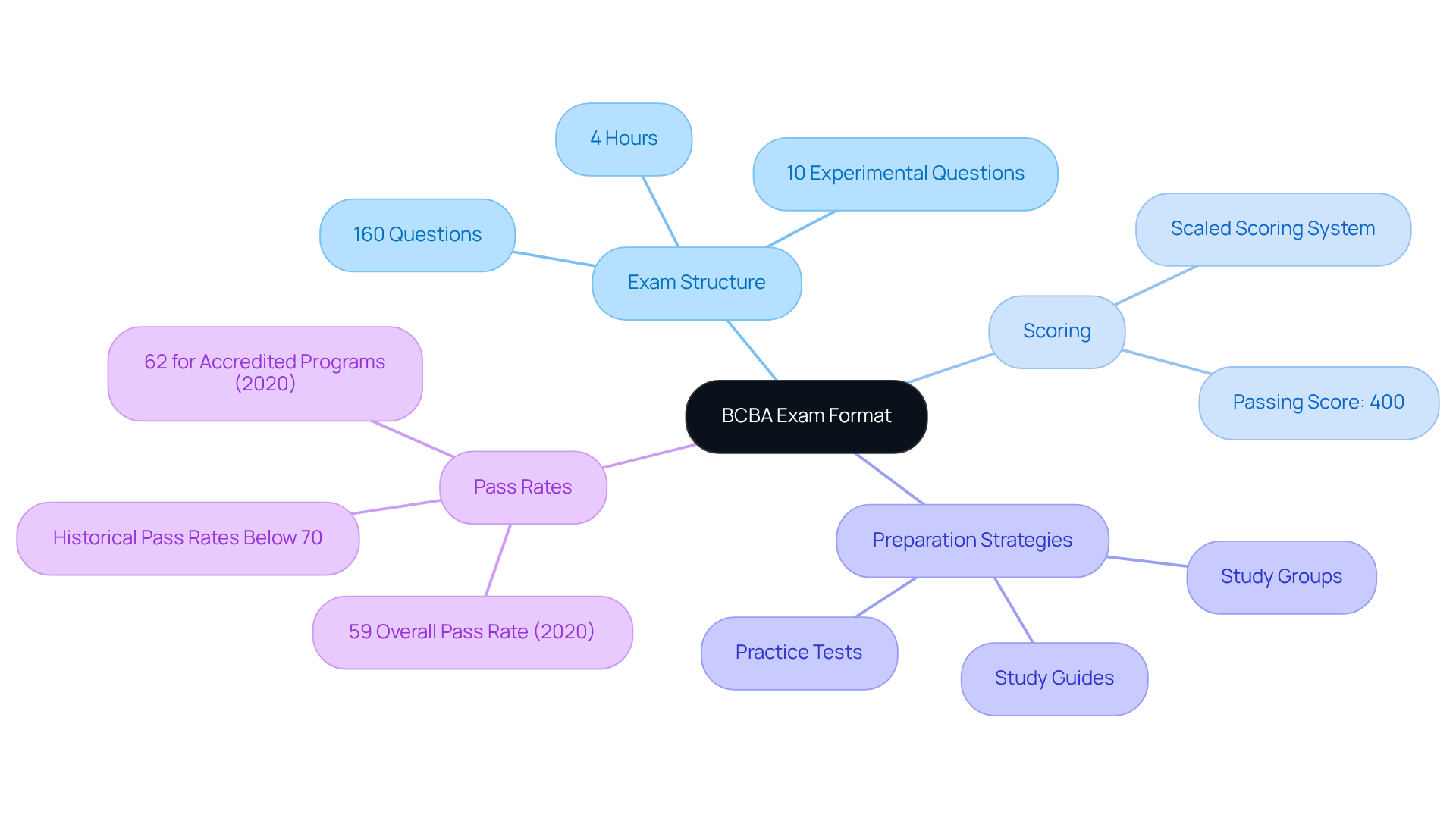
The demand for Board Certified Behavior Analysts (BCBAs) is projected to rise by 25% by 2026, highlighting the critical need for skilled professionals in this field. The serves as a vital guide for aspiring BCBAs, detailing the required for success. such as behavior assessment, intervention design, and ethical considerations is essential—not only for succeeding in the test but also for improving practical skills in real-world applications.
For instance, many BCBAs emphasize the into understandable terms. This fluency is crucial for and stakeholders. Statistics reveal that 44.4% of BCBAs and 46.7% of mental health specialists learned while on the job, underscoring the need for a strong foundation in these core competencies. Interacting with the Task List enables individuals to become acquainted with the BCBA exam questions, as well as the exam structure and requirements, ultimately resulting in enhanced performance and assurance.
As Bethany P. Contreras states, "the goal for our field is clear: for behavior analysts to engage in fluent that results in the best possible outcomes for our clients and society in general." By actively applying these competencies in practice, candidates can ensure they are well-equipped to meet the challenges of the field. The importance of mastering the competencies detailed in the Behavior Analyst Task List cannot be overstated, especially in light of the anticipated growth in demand for BCBAs.
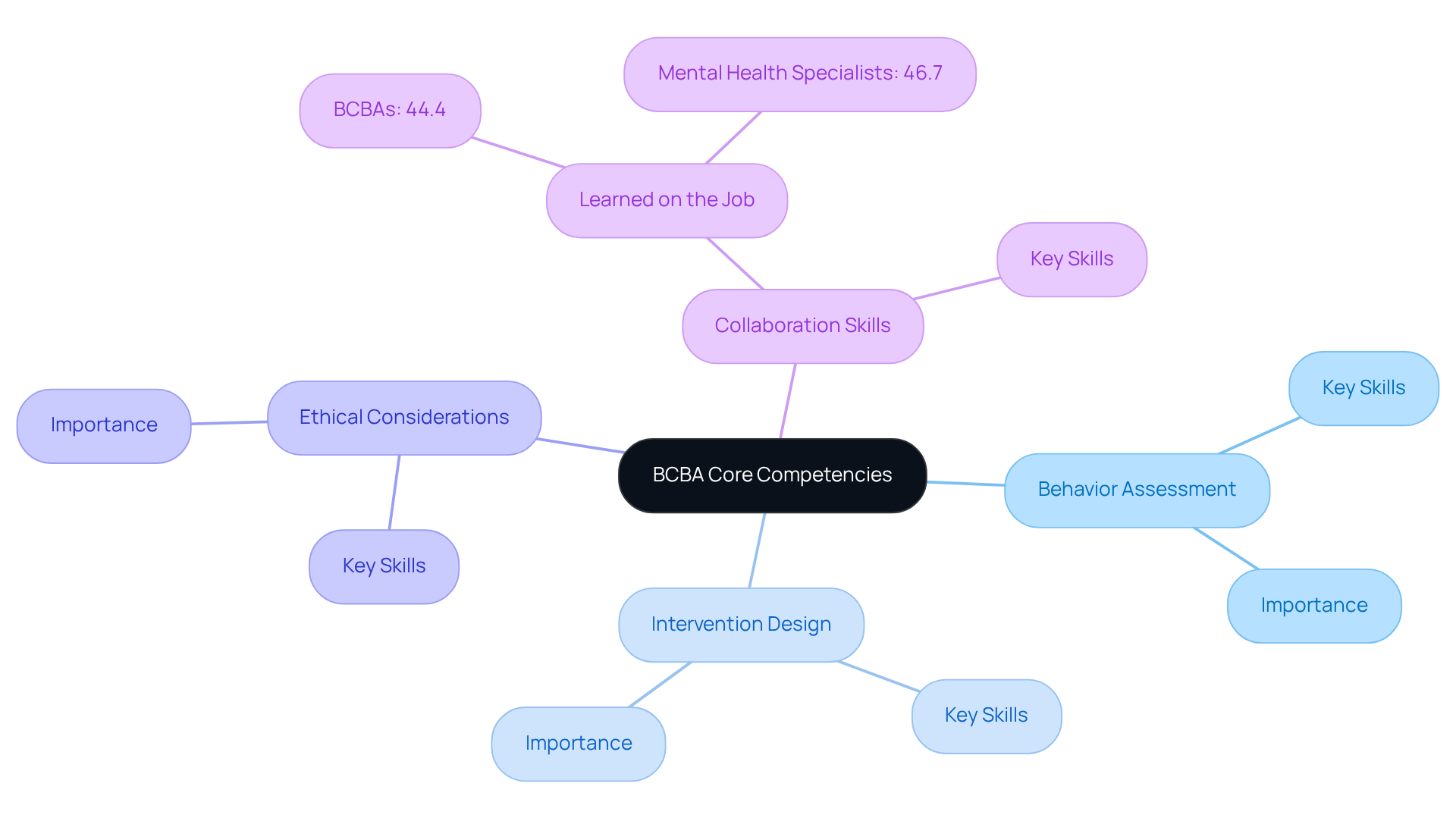
Participating in practice assessments that closely mimic the format is essential for . Did you know that candidates who consistently engage in comprehensive significantly enhance their likelihood of passing? Statistics indicate that hover around 65%. These practice tests not only assist in evaluating your preparedness but also familiarize you with the types of questions you will encounter on the actual assessment, which comprises 160 multiple-choice questions.
Evaluating your performance on these assessments allows you to identify weak points, enabling you to focus your learning efforts more strategically. Expert insights, such as those from Fayge Orzel, suggest that incorporating practice tests into your preparation routine can bolster comprehension and retention of essential concepts. This ultimately leads to on assessment day.
By utilizing these practical BCBA exam questions, you can develop a tailored to your individual needs, thereby enhancing your likelihood of success. Furthermore, managing through effective strategies can further improve your performance. Are you ready to take your preparation to the next level?
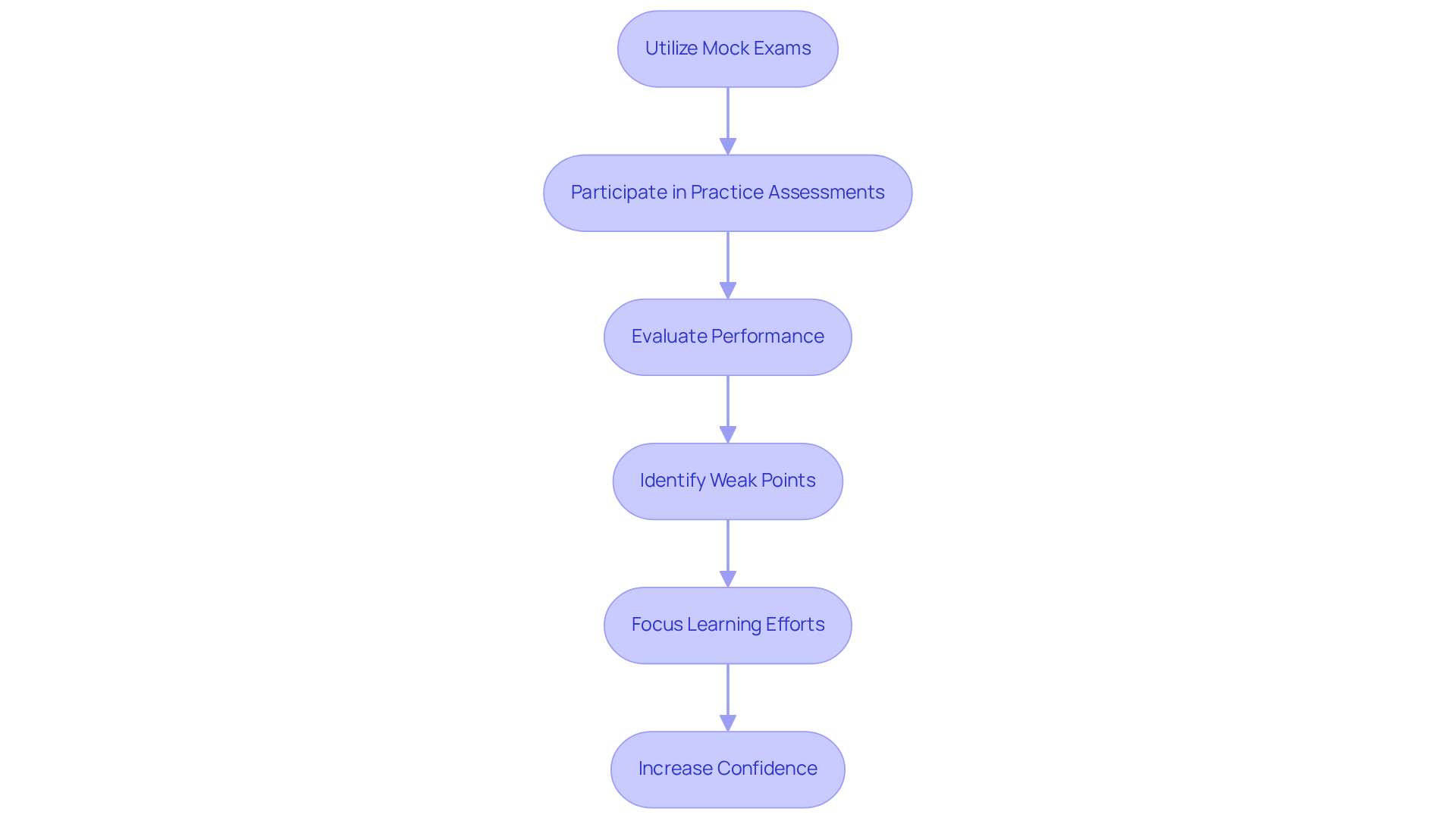
To excel in , it is essential to adopt such as spaced repetition, active recall, and summarization. Start by creating a tailored to your individual learning style and schedule. This ensures comprehensive coverage of all necessary material.
Allocate while utilizing flashcards to reinforce key terms and concepts. Have you considered teaching the material to someone else? This method not only solidifies your understanding but also enhances retention.
Furthermore, include featuring to become accustomed to the format and evaluate your preparedness. To effectively manage , integrate mindfulness exercises and self-care practices into your routine.
By incorporating these strategies, you can significantly enhance your likelihood of success on the assessment.
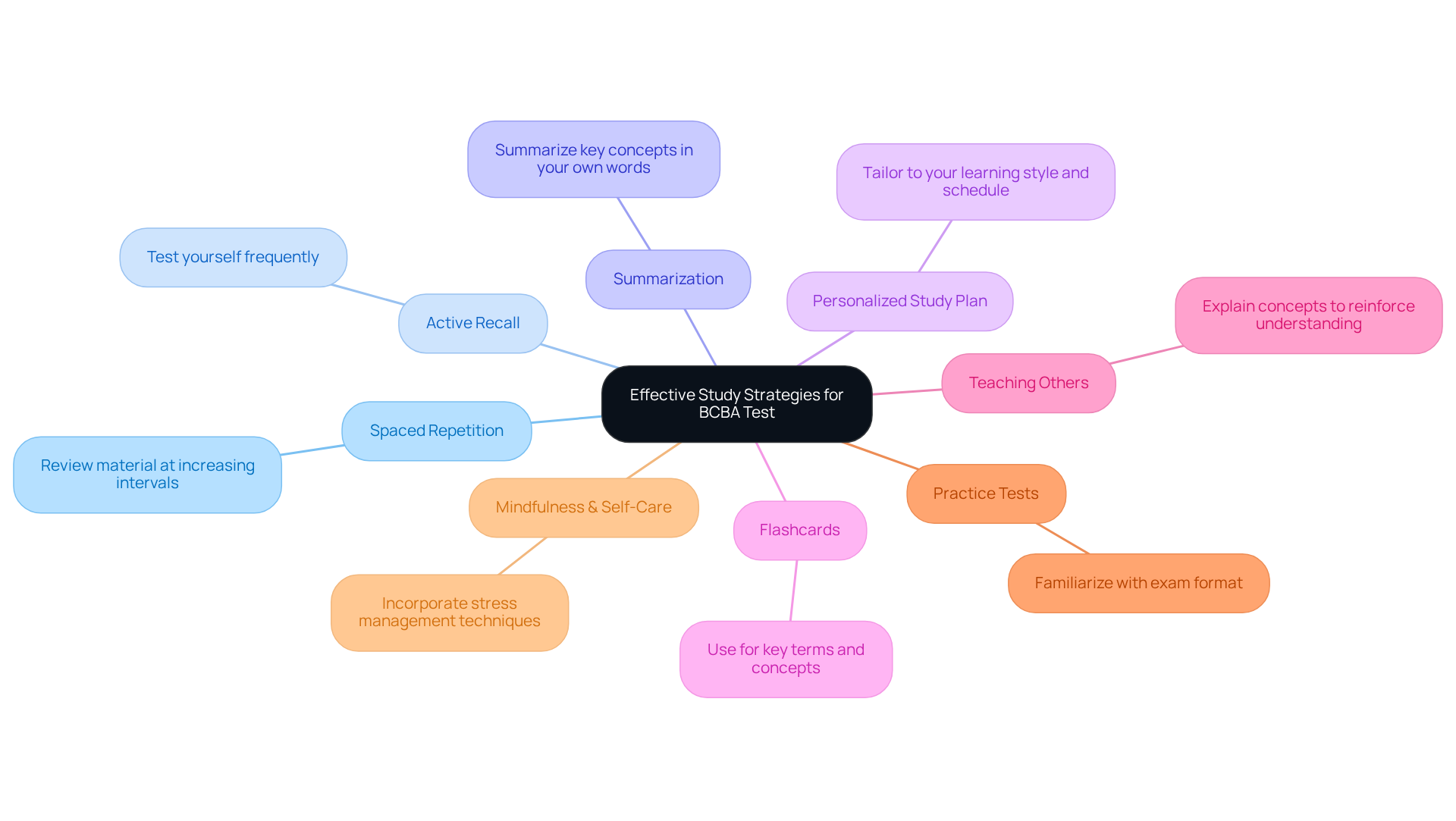
Joining discussion groups can significantly for the . Engaging with peers enables you to tackle challenging concepts, quiz one another, and exchange valuable resources. Research indicates that can elevate memory retention rates to 69%, in stark contrast to just 28% when studying alone. This striking difference underscores the in deepening your comprehension of the material and fostering motivation to maintain your learning routine.
Individuals who participated in reported a marked and retention of essential concepts, illustrating the advantages of cooperative education in the context of BCBA exam questions preparation. Experts assert that such group dynamics are crucial in today’s skills-based economy, where learning through interaction is increasingly recognized as a powerful success tool.
As Josh Bersin aptly states, " is the most valuable, useful, and memorable way to learn." By forming learning groups, you can cultivate a supportive network that not only enhances your readiness for the BCBA exam questions but also increases your chances of .
Furthermore, integrating and adhering to a are vital components for achievement, especially considering that the overall pass rate for first-time candidates hovers around 65%.
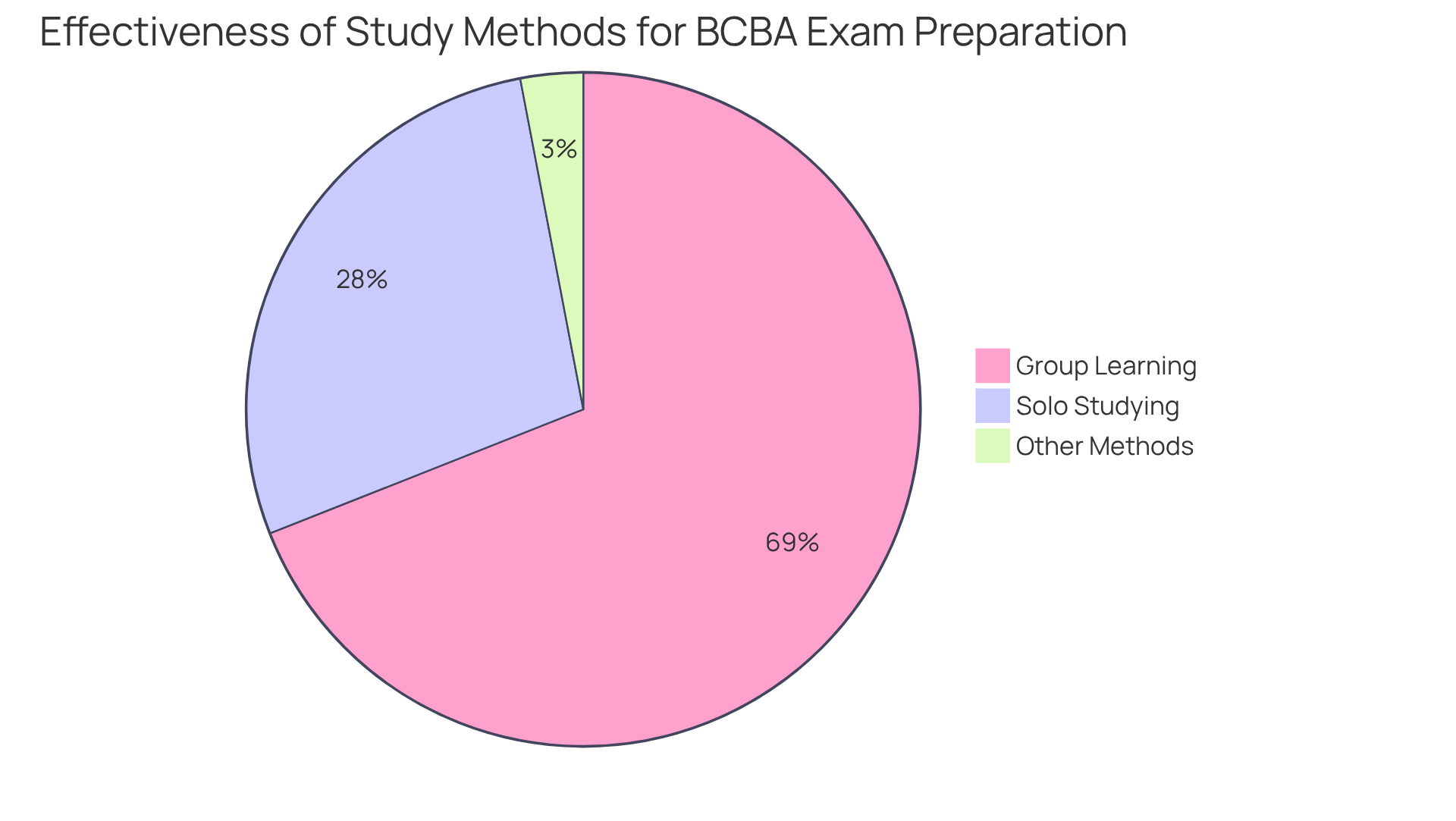
To succeed in , it is essential to recognize and utilize suggested learning resources, including:
These resources are specifically designed to align with the assessment material, providing a robust foundation for your studies. Candidates graduating from typically achieve higher pass rates on the compared to those from non-accredited programs, underscoring the importance of selecting accredited programs for optimal preparation. Accessing the latest editions and updates is crucial to remain informed about current assessment requirements.
Have you considered how participating in can ? Teamwork allows individuals to and exchange effective strategies. Furthermore, leveraging , such as tutoring, aids individuals in their certification assessment preparation and deepens their grasp of the test material.
As Fayge Orzel observes, prioritizing well-being and integrating into learning strategies can significantly enhance test performance. By utilizing these vital resources, candidates can elevate their preparation for the BCBA exam questions and increase their chances of success on the assessment.
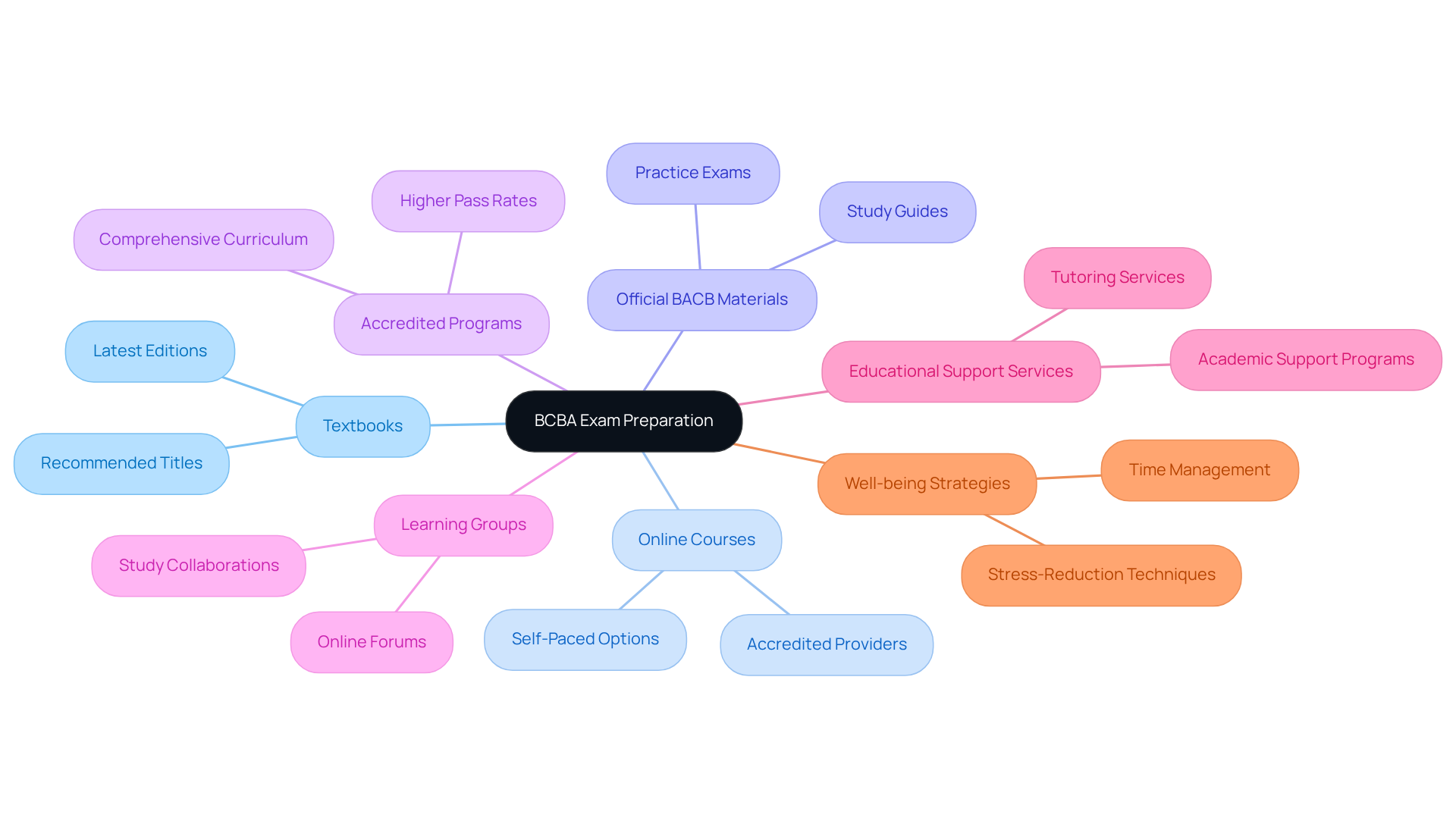
To effectively manage , it is essential to incorporate techniques such as into your preparation routine. Consistent application of these strategies fosters resilience and significantly .
Research indicates that ; for instance, a study revealed that participants who practiced mindfulness experienced a substantial decrease in anxiety levels and an increase in inner peace after just five days of training.
On the day of the assessment, take a few moments to center yourself—engaging in mindfulness exercises can help clear your mind and reduce stress. Additionally, enhances comprehension of behavior analysis principles.
By integrating these strategies, including an eight-minute mindfulness practice into your daily routine leading up to the assessment, you can and clarity, ultimately .
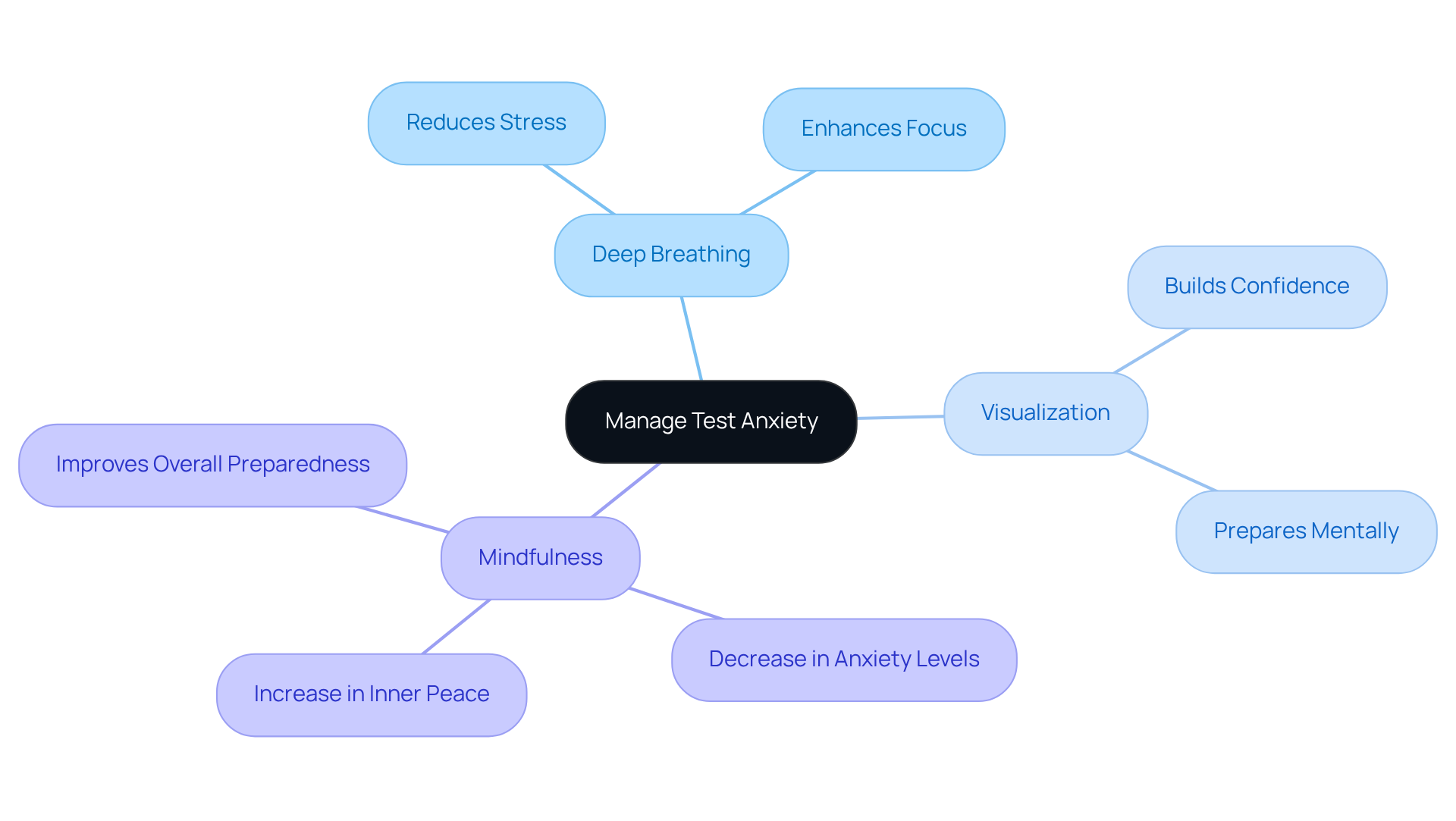
Finding a mentor who is a with experience in can significantly enhance your chances of success. Did you know that individuals who interact with mentors frequently achieve higher success rates? Statistics show that for those with mentorship assistance can surpass the national average of 65%. A mentor can provide , share personal experiences, and assist you in .
Regular check-ins with your mentor not only keep you motivated but also hold you accountable, fostering a productive study environment. Furthermore, , highlighting the broader significance of mentorship in professional development. Real-life examples demonstrate that many accomplished credit their success to the support of knowledgeable mentors.
As John C. Maxwell stated, "The people closest to me determine my level of success or failure," emphasizing . By finding a guide, you can acquire knowledge that will strengthen you during your certification journey.
Additionally, is essential for success, as generic schedules may not address individual learning styles and needs. Keep in mind that depending entirely on memorization of BCBA exam questions is inadequate for the certification's requirements; grasping concepts and their practical uses is essential.
Are you ready to take the next step in your certification journey with the right support?
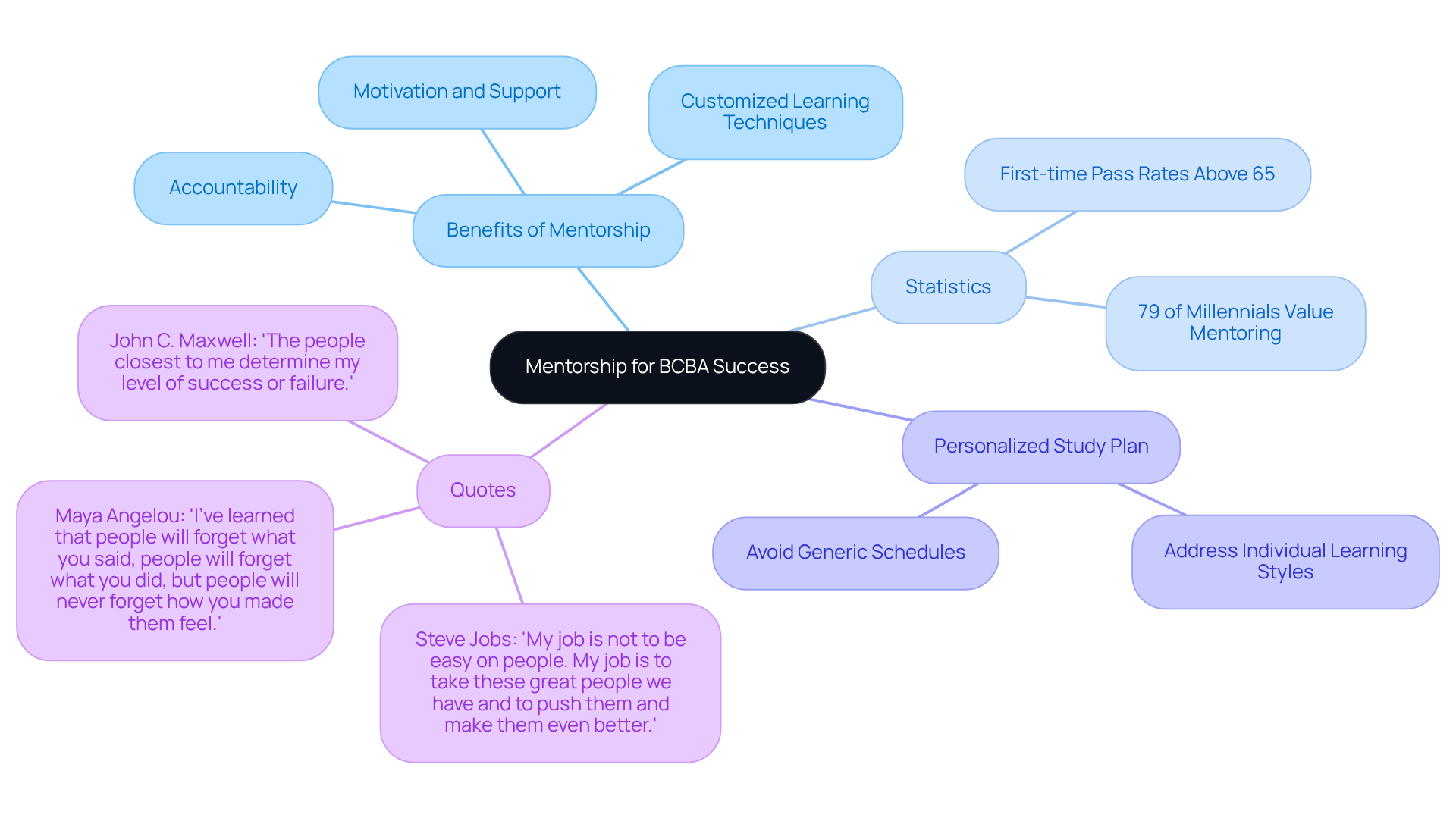
Acquaint yourself with the set by the , as they are vital for both answering the and maintaining ethical practice throughout your career. Consider this: the . Understanding the is not merely an academic exercise; it directly impacts the quality of care provided to clients. The code outlines essential standards that govern responsible conduct, client responsibility, and . For instance, BCBAs are expected to respect client dignity, obtain informed consent, and maintain confidentiality, which fosters trust and ethical relationships.
Statistics demonstrate the importance of these ethical standards: in 2021, 12,107 first-time test takers needed to grasp these principles to succeed in answering the BCBA exam questions. The need for professionals who can navigate ethical dilemmas effectively is critical in this growing field. Practical uses of the BACB ethical guidelines can be observed in various case examples, such as 'Understanding the BCBA Ethics Code,' which highlights the significance of . with interdisciplinary teams to develop that adhere to ethical standards, ensuring that interventions are tailored to individual needs while minimizing harm.
Participating in group review sessions can also improve comprehension of these ethical principles. This enables candidates to discuss scenarios and strengthen their knowledge. Incorporating strategies such as mnemonics, flashcards, and visual aids can further aid in mastering the Ethics Code. Utilizing spaced repetition and group study techniques can significantly . Ultimately, a solid base in ethical principles aids in achieving success in assessments and boosts the overall efficiency of behavior analysis in enhancing the lives of individuals with behavioral challenges.
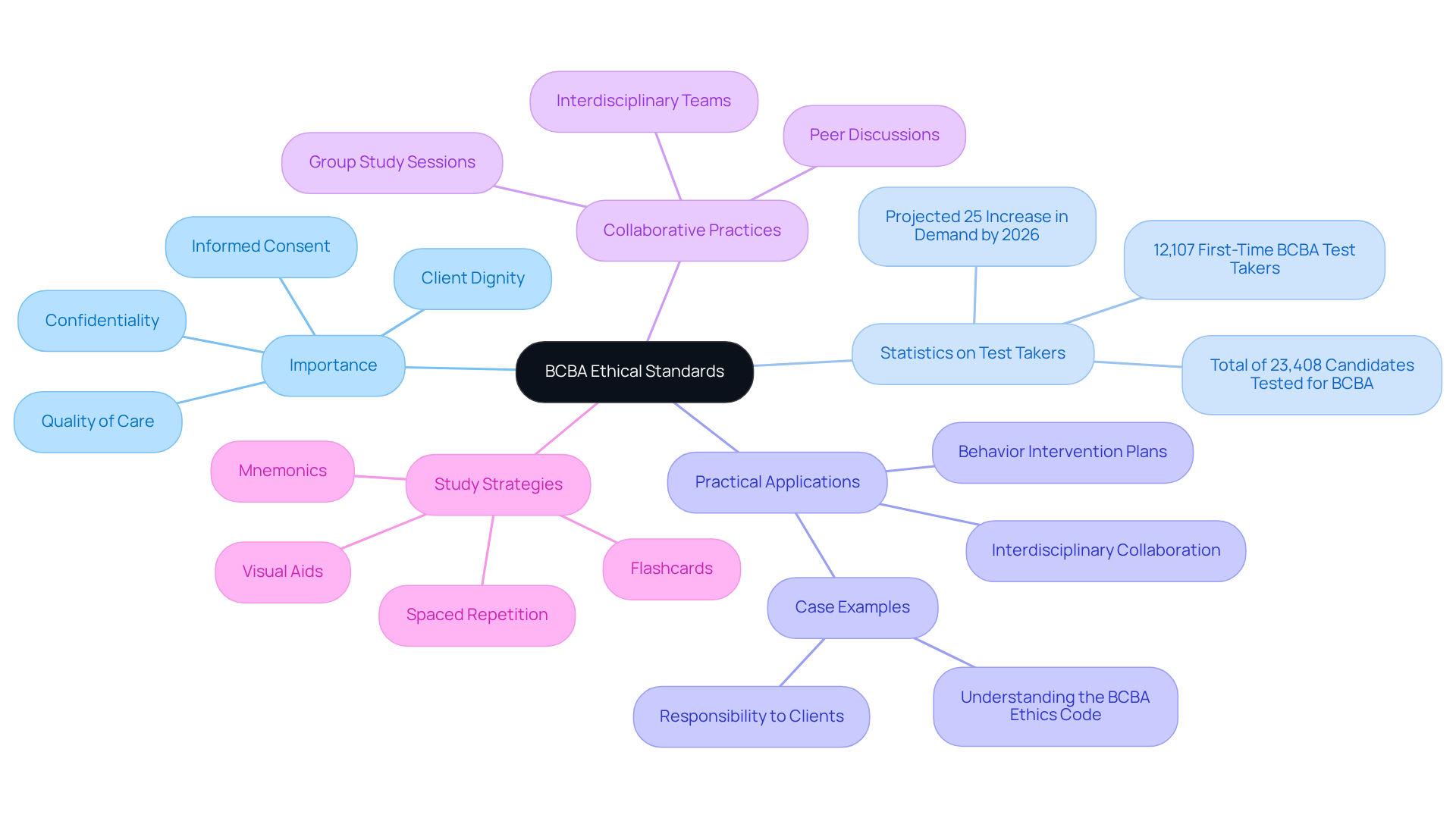
After completing practice tests, conducting a of your results is crucial. Identify patterns in the you missed to pinpoint specific . This not only deepens your understanding but also focuses your study efforts on critical topics. For instance, individuals who engaged in this analysis frequently reported .
Data from 2013 to 2020 indicates that the overall for certification seekers was 64%, underscoring the importance of . Dana Meller highlights that many candidates experience score variability based on their , reinforcing the necessity of this reflective approach. By systematically addressing these weaknesses, you can build a stronger knowledge base, ultimately increasing your chances of success on the BCBA exam questions.
To optimize your efforts, consider developing a based on your mock exam results, ensuring you dedicate adequate time to each identified area of weakness.
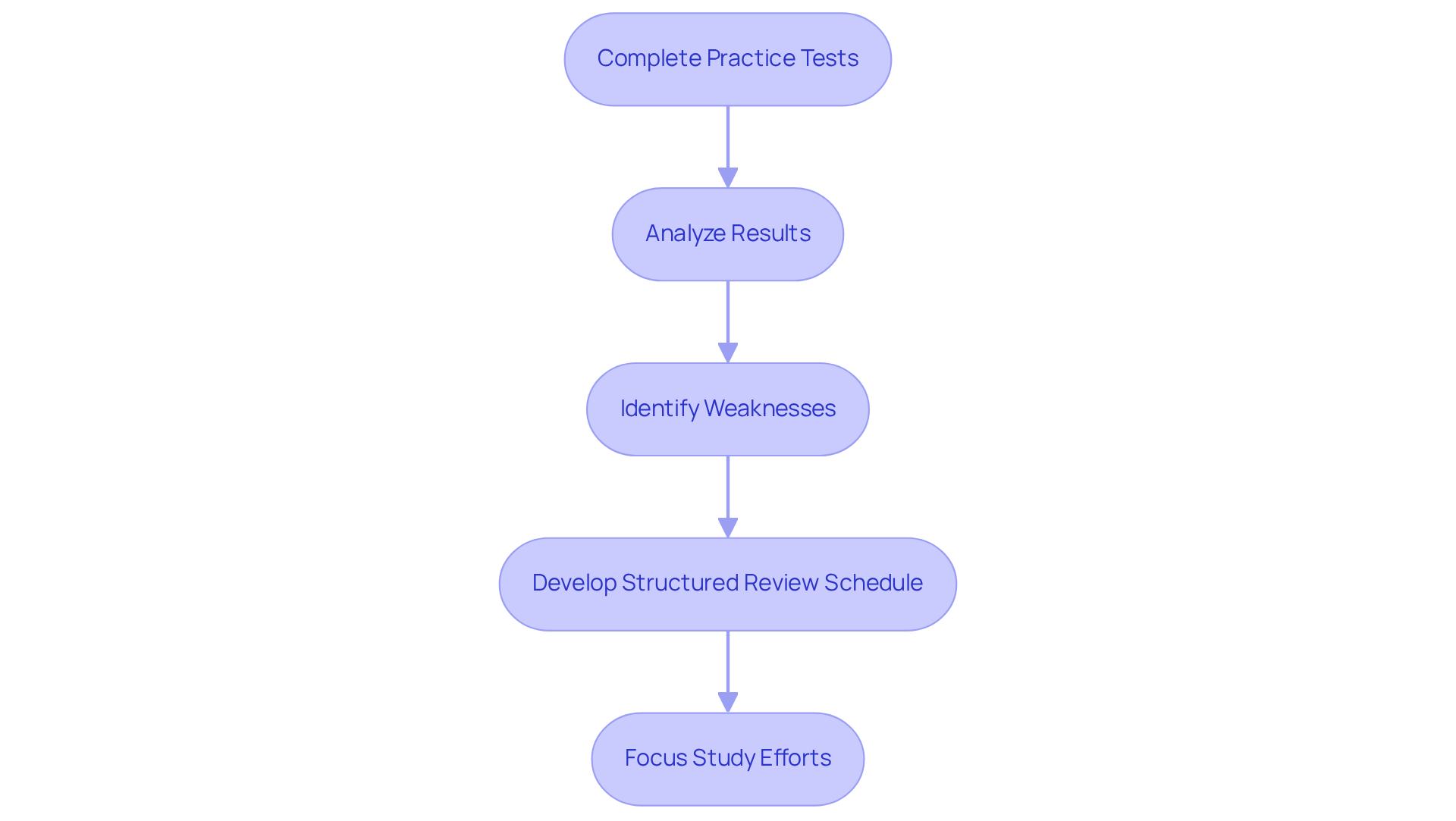
The path to successfully passing the BCBA exam is not merely a journey; it is a strategic endeavor that requires thorough preparation and a deep understanding of the exam's structure and content. Candidates who focus on essential study techniques, familiarize themselves with the BCBA Task List, and engage in collaborative learning can significantly enhance their readiness for this pivotal assessment. Moreover, emphasizing the importance of ethical standards and practical experience fortifies the foundation necessary for effective behavior analysis practice.
Key insights underscore the value of mock exams, mentorship, and effective study strategies in achieving a higher pass rate. Have you considered how utilizing recommended resources, joining study groups, and managing test anxiety through mindfulness techniques can transform your preparation approach? These components are critical to fostering a well-rounded preparation strategy. Additionally, reflecting on practice exam results empowers candidates to identify weaknesses and concentrate their efforts where they are needed most.
Ultimately, the journey toward BCBA certification transcends the goal of merely passing an exam; it is about equipping oneself with the knowledge and skills essential for making a meaningful impact in the field of behavior analysis. Aspiring BCBAs are urged to embrace these preparation strategies, seek support from mentors, and actively engage with their learning communities. By doing so, they can confidently approach the exam and embark on a rewarding career dedicated to improving the lives of individuals facing behavioral challenges.
What is the format of the BCBA exam?
The BCBA exam consists of 160 multiple-choice questions, including 10 experimental questions that do not affect the final score. Candidates have four hours to complete the exam.
What topics are covered in the BCBA exam?
The exam evaluates candidates' understanding of essential behavior analysis principles, including ethics, assessment, and intervention strategies.
What is the passing score for the BCBA exam?
The passing score for the BCBA exam is set at 400, utilizing a scaled scoring system to account for variations in test difficulty.
What are some effective preparation strategies for the BCBA exam?
Effective preparation strategies include participating in study groups, using detailed study guides, and taking practice tests to enhance comprehension and retention of complex concepts.
What were the pass rates for first-time BCBA candidates in 2020?
In 2020, first-time candidates from accredited programs had a pass rate of 62%, while the overall pass rate for first-time candidates across all program types was 59%.
How can hands-on experience in ABA impact the BCBA exam experience?
Individuals with hands-on experience in ABA, especially those who complete additional supervision hours, often find the assessment less intimidating, as they can relate theoretical knowledge to practical situations.
Why is it important to familiarize oneself with the BCBA Task List?
Familiarizing oneself with the BCBA Task List is crucial for mastering core competencies required for the exam and for practical applications in the field, such as behavior assessment and ethical considerations.
How can mock exams help in BCBA exam preparation?
Participating in practice assessments that mimic the BCBA exam format helps candidates evaluate their preparedness, familiarize themselves with the types of questions, and identify areas of weakness for focused learning.
What is the impact of practice tests on BCBA exam pass rates?
Candidates who engage in comprehensive practice tests significantly increase their likelihood of passing, with first-time pass rates around 65%.
How can candidates manage test anxiety during the BCBA exam?
Candidates can manage test anxiety through relaxation techniques and positive self-affirmation, which can enhance their performance on the assessment day.
Our expert recruitment strategies and AI-driven sourcing ensure that you receive top-notch candidates quickly, without compromising on quality. Whether you’re looking for BCBAs, Clinical Directors, or RBTs, we’ve got you covered.